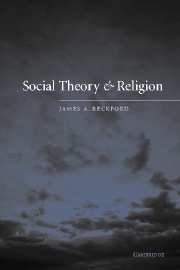5 - Social theory and religious movements
Published online by Cambridge University Press: 18 December 2009
Summary
Social and political contexts
Social scientists aspire to explain or interpret the patterns that they detect in social relations, social processes, cultural meanings and social structures. The results of their work are often contentious but sometimes persuasive. By contrast, their attempts to predict the future are rarely successful. The development of religious movements is a good case in point. Even those scholars who were familiar with earlier generations of religious movements had not foreseen that a wide range of new religious movements (NRMs) would quickly emerge in the 1960s, attract new members and achieve public notoriety in many advanced industrial societies. Only in Japan where the production of new religions, or at least new combinations of religious beliefs and practices, had been accelerating over the course of the twentieth century (and particularly after 1945) had researchers and commentators detected signs of a ‘Rush Hour of the Gods’ (McFarland 1967). The possibility of an upsurge of interest in movements such as the Church of Scientology, the Unification Church (now the Family Federation for World Peace and Unification [also known as the Unificationist Movement]), the Children of God (now The Family), the International Society for Krishna Consciousness (ISKCON) and Transcendental Meditation (TM) was not only unexpected but also improbable from the point of view of the dominant strands of social theory at that time. The resurgence of Hindu nationalist movements in India and elsewhere was not widely anticipated. Nor was the growth of interest in radical movements in Islam.
- Type
- Chapter
- Information
- Social Theory and Religion , pp. 150 - 192Publisher: Cambridge University PressPrint publication year: 2003



